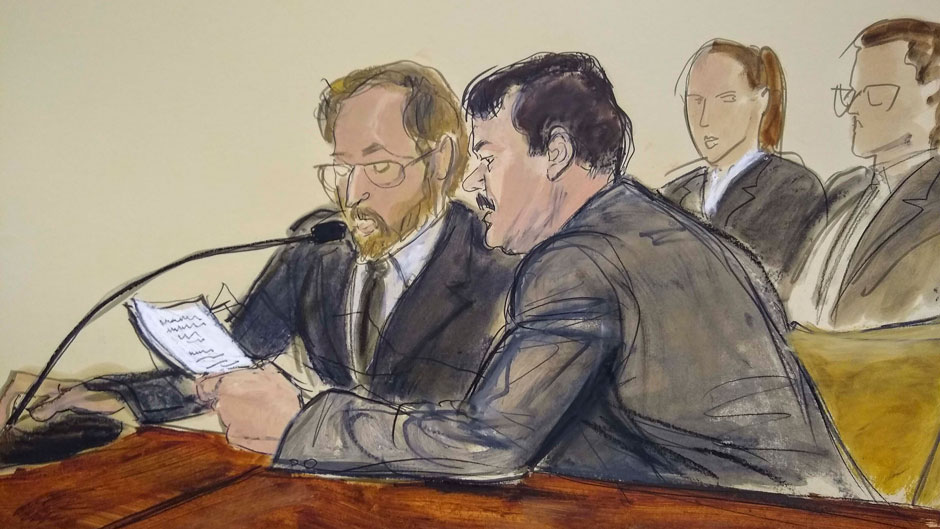Mexican drug lord Joaquin “El Chapo” Guzman was sentenced to life in a federal court in New York last week. Guzman had been the leader of the Sinaloa drug cartel and was considered the force behind the drug trade across the Western Hemisphere for almost 30 years.
He and his cartel were responsible for shipping more than 200 tons of cocaine to the United States, as well as brutal murders and political payoffs, prosecutors said during the U.S. court trial.
But what does his arrest and conviction mean? Bruce Bagley, professor of International Studies in the University of Miami College of Arts and Sciences and an expert on the drug trade, weighs in.
Joaquin “El Chapo” Guzman was sentenced to life in prison. How significant is this sentencing?
It’s significant to get one of the world’s major drug lords behind bars for life plus 30 years, which is the sentence he got. So “El Chapo” has been eliminated from the scene.
Has his capture meant that the Sinaloa cartel has been dismantled?
This has not affected the Sinaloa cartel. It continues. It is still the largest cartel operating in Mexico, transiting cocaine from the Andes to the United States, shipping out heroin. It is also involved in methamphetamines and counterfeit opioid pills. The drug lord who co-founded Sinaloa with him is a man named Ishmael “El Mayo” Zambada, who is in his seventies now. “El Mayo” has continued, so their operations have continued virtually unchanged.
What does this mean for Mexico?
“El Chapo” was arrested in 1993, escaped in 2001 and created the Sinaloa cartel. He operated in Mexico footloose and fancy free for 13 years (from 2001 to 2014). He was arrested and then escaped in 2015. He was arrested again in 2016 and then processed and ultimately extradited to the U.S. in 2017, tried in 2018 and then sentenced.
Mexico was not able to try “El Chapo,” it was not even able to hold him there. More significantly, it not only blew any propaganda advantages because “El Chapo” was able to escape so often, able to tunnel his way out. But drug trafficking has become more intense, more violent, more brutal as we have seen shifts in the organizational structures of the cartels in Mexico.
In 2012 there were eight major organizations; there are now 80 major drug organizations in Mexico. Some really big ones like Sinaloa, Jalisco, Nueva Generacion, which is a burgeoning new cartel. The Zetas continue to operate in Tijuana and Juarez. Any number of other organizations are operating there.
In the first six months of President Andrés Manuel López Obrador’s AMLO government, violence has skyrocketed. Mexico is basseted and besieged by drug related violence and criminal activity, which has not been reined in at all. Rather, it has gotten more out of control. Any chance that Mexico could have taken advantage of “El Chapo’s” arrest and incarceration for three years has been lost by the ongoing slaughter that is taking place.
We have seen fragmentation and diversification of these criminal organizations in Mexico. As they have fragmented, they have become more deeply involved in a number of other criminal activities. It is in extortion and the theft of gasoline, oil, automobiles, human trafficking, especially in women and children, arms trafficking, money laundering, blackmail and kidnapping, extortion of storeowners. There has been a proliferation, fragmentation, and diversification in organized crime well beyond what we saw six years ago or 12 years ago.
Has his capture curtailed the drug trafficking from Mexico to the U.S.?
Not at all. The exact opposite happened. It set in motion a set of centrifugal forces in which additional fragmentation has taken place. The Sinaloa cartel is an interesting model. It is what I call a hub and spoke model so it is a spoke with hubs around it, with autonomous organizations, sub-contractors and affiliated gangs. The arrest of “El Chapo” and the internecine fighting going on has increased the level of violence in Mexico and increased the overall drug trade, both coming from the Andes because Colombia is producing more cocaine than ever, and the various drugs that are cultivated and manufactured in Mexico.
These range from opium poppies for heroin to methamphetamines to counterfeit opioid pills that are fueling the drug overdose crisis that the U.S. is confronting. All of those mean that Mexico is more deeply entrenched in the drug trade and organized crime is more powerful than it has ever been in Mexico.
Will his sentencing serve as a deterrent to others involved in the drug trade?
It is important to send a signal that people like “El Chapo,” the major capos, the major drug lords in Mexico will not be free to enjoy their ill-gotten game. So, it is a symbolic victory for both Mexico and the United States. It is largely pyrrhic because organized crime has continued to multiply and proliferate. Mexico confronts a worse security dilemma today than it did when they arrested “El Chapo.”

